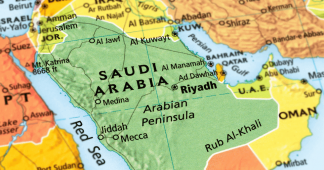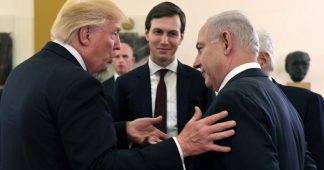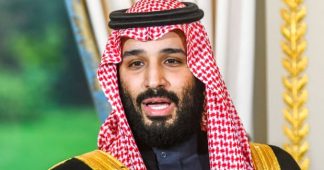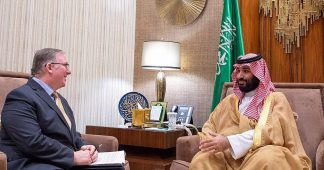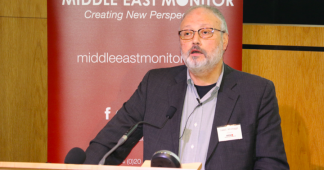Posted on
President Donald Trump inexplicably took his first foreign trip to Saudi Arabia, an absolute monarchy with neither religious nor political freedom. On that trip in March 2017 he began to subcontract U.S. Mideast policy to a trio of self-serving regional leaders.
Trump’s Mideast policy catered to this malign troika (along with American munitions makers), showering its members with weapons, aid, and support. Their wish was the president’s command, irrespective of US interests. Indeed, visiting US officials played the role of docile and obedient servants, genuflecting on arrival. So complete was the administration’s subservience to the desires of its nominal allies that some critics posited possible financial corruption, perhaps promised post-presidential investments.
One was Mohammed bin Salman, who shortly thereafter was installed as crown prince of Saudi Arabia. The most ostentatiously brutal, corrupt, and reckless of the trio – the architect of both the murderous aggressive war against impoverished Yemen and the infamous slice and dice operation against journalist Jamal Khashoggi – MbS is an embarrassment to both Islam and his country.
The only moment President Trump deviated from his Saudi-first policy was when Riyadh’s cheap oil strategy put American shale oil producers at risk. So long as MbS was only imprisoning and torturing his own people, murdering a US resident, isolating a neighboring Gulf kingdom, subsidizing jihadist insurgents including an al-Qaeda affiliate, kidnapping dissident royals from abroad, detaining another country’s prime minister, and slaughtering civilians in a neighboring nation, all was well. The incoming Biden administration should indicate that it will not welcome him to the White House. He does more to undermine than advance American interests.
The second dubious “ally” was Mohammed bin Zayed, the crown prince of the United Arab Emirates. His activities are publicly more presentable, but in practice no less malign than MbS’s crimes. MbZ’s government is a partner with the Kingdom of Saudi Arabia in committing murder and mayhem in Yemen. Indeed, UAE may be the worse aggressor, having promoted separatism in the nation’s south, making a stable and peaceful Yemen even less likely. Abu Dhabi also is repressive, but at least does not turn its consulates into human abattoirs and ban faiths other than Islam.
The UAE benefited greatly by avoiding the Saudis’ garish crimes. Oppressive, but not bloodthirsty. Aggressive, but with a competent military – known as “Little Sparta” by the Pentagon. Repressive, but not insistent that Washington punish US critics. The Emirates appears to be ending the Trump era on a high note, receiving a $23 billion sale of F-35s as a reward for recognizing Israel and tossing Palestinians under the proverbial geopolitical bus.
The only plausible argument for the weapons transfer, other than enriching America’s merchants of death, is to empower the UAE to defend itself, presumably against Iran. However, Washington has indicated no willingness to back away and turn defense responsibilities over to Abu Dhabi. Worse, the UAE’s military involvement in the region has been almost entirely malevolent: invading Yemen, underwriting Islamist insurgents in Syria, promoting civil war in Libya, and threatening to invade Qatar. Upgrading the Emirati arsenal is likely to make the regime even more aggressive, brutal, and dangerous.
Indeed, if Abu Dhabi was a normal foreign government, Congress would have halted the administration’s political pay-off. As Sen. Chris Murphy (D-Conn.) observed, “The UAE has violated past arms sales agreements, resulting in US arms ending up in the arms of dangerous militia groups, and they have failed to comply with international law in Libya and Yemen.” Perhaps the Emirates’ most shocking behavior in Syria and Yemen was supporting local al-Qaeda affiliates, which included the diversion of US weaponry. President Trump is so determined to reward his dictator friends that he doesn’t mind if they support terrorist groups linked to one which killed thousands of Americans. Nor, it turns out, does the Republican majority in the Senate, which refused to block the sale. Biden should end Abu Dhabi’s undeserved exemption from scrutiny.
Finally, completing the self-absorbed trio was Benjamin Netanyahu, Israel’s seeming prime minister for life, who has openly colonized the West Bank while enforcing a militarized system of Apartheid. During the Trump administration he looked to Washington for support as he sought to avoid trial for corruption amid multiple inconclusive elections. With another vote expected this spring, he hopes to construct a Knesset majority which will insulate him from prosecution, the Israeli equivalent of a personal presidential pardon.
Although America is a tolerant home for divergent religious and political views, the Trump administration tied itself to an extreme nationalist government in Israel which abandoned any pretense of seeking peace with the Palestinians. Instead, Netanyahu’s government sought to lock them in a permanently inferior status while using them as cheap labor for Israeli economic development, rather like Helots in ancient Sparta. The administration dropped any feigned concern for Palestinians and made its overriding policy doing anything and everything possible to aid Netanyahu’s reelection prospects.
Ironically, Trump’s tight embrace has made Israel the political loser. By turning support into a partisan issue, the administration accelerated growing Democratic concern for Palestinians who have suffered under an oppressive foreign occupation for more than a half century. Moreover, by making the litmus test of being “pro-Israel” supporting the most radical demands of a religious-ethnic state abroad and limiting the freedom of speech of critics at home, President Trump transformed Israel into a divisive political issue. Biden should end Washington’s counterproductive “special relationship” with Netanyahu.
Turning US policy over to these three states badly undermined American interests, dragging Washington into the Sunni-Shia struggle. Paradoxically, the US took the side which produced the most terrorists – al-Qaeda and the Islamic State are Sunni organizations. In fact, Shia Iran was an indirect American ally in battling the latter. Washington would have been far better off continuing the Obama policy of seeking to open up Iran rather than tie America to the Saudi Ancien Regime, which is less free – essentially totalitarian – on both politics and religion than Iran.
Moreover, the administration’s decision to withdraw from the JCPOA and launch the campaign of “maximum pressure” has been an abject failure. While the administration was proclaiming the restoration of deterrence, certainty of renegotiation, and accumulation of great leverage it was withdrawing US personnel from its embassy in Baghdad, after a fearful Secretary of State Mike Pompeo publicly mulled the necessity of closing the facility. Evidently US power and resolve had not cowed Iran. Instead, Tehran responded to Washington’s provocations by disrupting Gulf oil traffic, sending gasoline to Venezuela, continuing its proxy activities in Iraq, Lebanon, and Syria, inspiring rocket attacks on US bases and the embassy in Iraq, destroying much of Saudi Arabia’s oil facilities, and increasing its nuclear activities. Heck’uva job, Donny!
The best that can be said for Trump’s Mideast policy is that it isn’t as bad as that of George W. Bush, highlighted by the invasion of Iraq. That failure was catastrophic, resulting in thousands of dead Americans, tens of thousands of wounded Americans, hundreds of thousands of dead Iraqis, and millions of displaced Iraqis, plus the destruction of multiple minority religious communities, rise of al-Qaeda in Iraq and ISIS, and strengthened role of Iran.
Barack Obama came in a close second with his appalling support for the Saudi/Emirati invasion of Yemen. However, the Trump administration adopted that war as its own. The consequences have been similarly disastrous, as detailed by Human Rights Watch: “civilians suffer from a lack of basic services, a spiraling economic crisis, abusive local security forces, and broken governance, health, education, and judicial systems.” Perhaps 20,000 civilians killed by combat, with another 130,000 civilian dead as a consequence of the conflict. Most of the population lacks clean water, necessary sanitation, sufficient food, and adequate health care. An incredible 80 percent of Yemen’s 30 million people requires outside assistance.
Yemen has suffered from internal and external conflict most of its six decades of independence. The Obama administration got involved in 2015 only to placate Riyadh and Abu Dhabi, which were outraged that Washington sought peace with Tehran. The Trump administration followed his predecessor’s policy for the same reason.
The idea of an “America First” policy has been discredited by its association with Trump. However, there is a desperate need to put America first after the Trump administration spent three years in the Middle East acting on behalf of Saudi Arabia, the UAE, and Israel rather than the US Putting Americans before the malign MbS-MbZ-Netanyahu troika would be a good start for the incoming Biden Administration as it seeks to refashion US Mideast policy.
* Doug Bandow is a Senior Fellow at the Cato Institute. A former Special Assistant to President Ronald Reagan, he is author of Foreign Follies: America’s New Global Empire.
Published at original.antiwar.com
